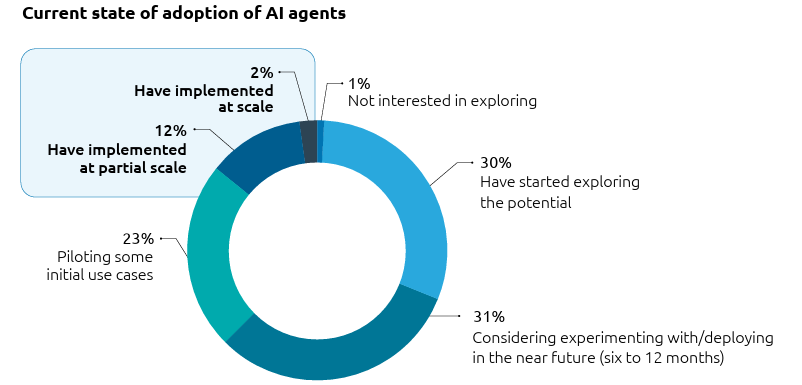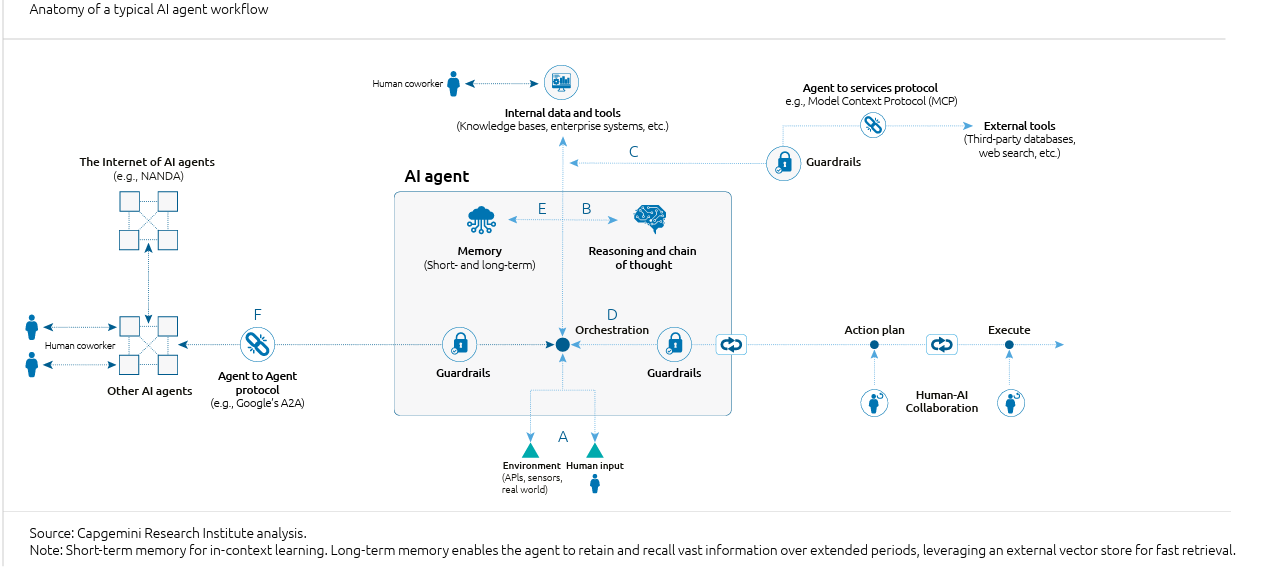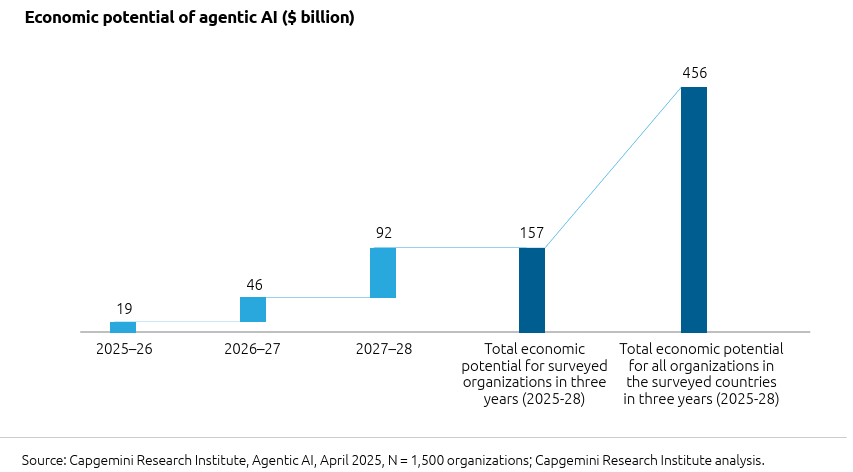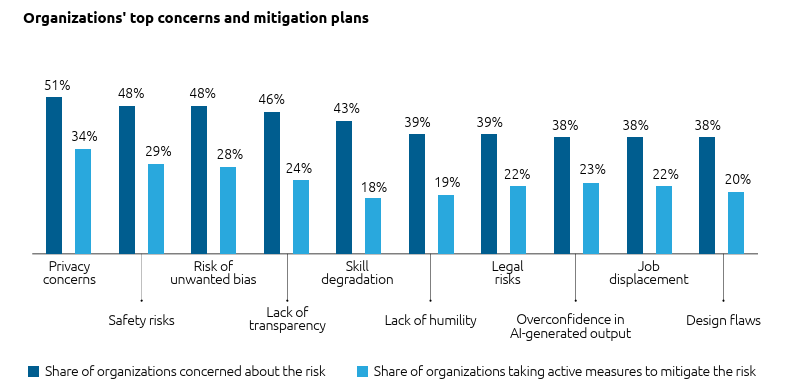FintechZoom.com | Your Gateway to Financial Insights
- Home
-
Stocks Updates
- News
-
Finance Tools
- Crypto Profit Calculator
- Savings Goal Calculator
- Compound Interest Calculator
- Currency Converter
- Tax Calculator
- Retirement Planner
- Net Worth Tracker
- Investment Portfolio Calculator
- Credit Card Payoff Calculator
- Monthly Budget Planner
- Mortgage Affordability Calculator
- Debt-to-Income (DTI) Ratio Calculator
- Fuel Cost Calculator
- Stock Return Calculator
- Loan EMI Calculator
- Latest Blogs
- Jobs Updates
In 2028, Agesic AI can deliver $450B in trust and preparation gap
Breaking Fintech News: Stay updated with the latest in the financial technology world.
Table of Contents
Free newsletter
Get the hottest Singapore news in your inbox every month
Agesic AI is expected to generate up to $40 billion in economic value by 2028.
However, with growing interest, only 2% of organizations shrinking completely, trust in AI agents is declining.
Many people have found that AI agents have the greatest influence when humans participate in Rema Central.
according to Capgemini Institute, titled “The rise of proxy AI: How to trust the key to human AI cooperation“, almost three-quarters of executives see the benefits of over-cost human oversight, while 90% say human participation in AI-driven workflows is positive or costly.
The report highlights trust and oversight as key to unlocking the potential of proxy AI, and points out the gap between strategic ambitions and operational preparations that you have a scholarship as a major obstacle to achieving the $450 billion opportunity for the program.
Although proxy AI is a type of development technology, most organizations are still in the early stages of adoption.

While nearly a quarter of pilot projects have started and 14% have already started implementation, most are still in the planning stage.

This cautious advancement contrasts with the high ambitions of leadership: 93% of business leaders believe that expanding AI agents over the next 12 months will provide a competitive advantage, but almost half of the creatures still lack the strategy to do so.

“The economic potential of AI agents is important, but realizing that this value depends not only on technology, but also requires a comprehensive and strategic shift between people, processes and systems,” he said.
Franck Greverie, chief portfolio and technology officer, global business line leader and member of the Capgemini Group Executive Committee, said.
“To be successful, organizations must continue to focus on results, reimagine the process through AI-FIRC to support effective human chemistry, create the right conditions for the first system to enhance human judges and help excellence in business outcomes.”
According to the report, trust in fully autonomous AI agents has dropped from 43% to 27% over the past year, with one in five executives saying the risks outweighing the benefits.
Only 40% of organizations say they trust AI agents to perform tasks independently.
However, trust appears to increase with experience: 47% of organizations at the implementation stage reported average trust among AI agents, targeting it at 37% during the exploration stage.

As a result, organizations will pay more attention to transparency, decision-making clarity and ethical guarantees.
The report found that the value of proxy AI lies in solving core business problems and reshaping the way it works.
Within one year, more than 60% of organizations expect to establish human AI agents as subordinates or enhance human volumes’ teams.
In this case, agents are moving beyond the role of tools and are becoming active participants in the team.
About 70% of organitis expect that the integration of AI agents will require structural changes, prompting team composition and workflow reassessment.
As humans continue to participate, organizations expect human engineering to increase by 65% for high-value tasks, creativity increases by 53% and employee satisfaction increases by 49%.
The estimated $40 billion in new economic value from AI agents includes revenue growth and operational efficiency, driven by semi-autonomous systems deployed to fully autonomous systems.
Organizations with an expected implementation scale are expected to generate an average of $382 million over the next three years, while organizations at the early stages will reach $76 million.
In the short term, AI agents are most likely to be used in customer service, IT and salt and further expand into operations, R&D and marketing in the coming years.

Currently, only 15% of business processes are semi-autonomous, and by 2028, that expectation will grow to 25%.
Currently, most agents are supporting roles, like assistants or co-pilots, managing daily tasks rather than independently performing complex workflows.
The report notes that most organizations have not been able to effectively scale proxy AI. 80% lack mature AI infrastructure, and less than 20% of data report high levels of data ready.
Ethical issues such as data privacy, algorithmic bias and lack of interpretation are still common.
For example, although more than half (51%) of organizations view privacy as a concern, only 34% are actively addressing this privacy issue.
Additionally, only half of business leaders say they fully understand the capabilities of AI agents, and fewer Uble can determine where Systems perform better than traditional automation.
To fully realize the benefits of proxy AI, Capgemini recommends that organisms go beyond hype and focus on redesigning processes, rethinking business models, reorganizing teams, and balancing automation with human supervision.
Featured Image Source: Capgemini Institute












No Comments